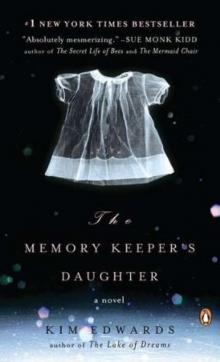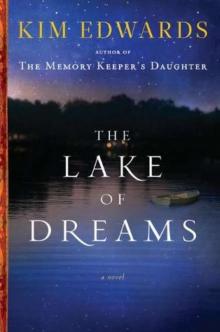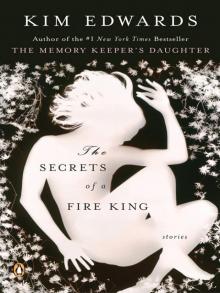- Home
- Kim Edwards
The Secrets of a Fire King
The Secrets of a Fire King Read online
Praise for The Secrets of a Fire King
“Stunning…[Edwards’s] sinuous prose and endless empathy work their spell…. Radiant, original, and passionate, these are memorable stories.”
—Andrea Barrett, author of Ship Fever
“The Secrets of a Fire King gives eloquence to their astonishing range of discoveries and leaves the reader entranced.”
—Nina Sonenberg, The New York Times Book Review
“This collection introduces a writer whose name will soon be familiar to lovers of clean, direct, responsible prose and an interest in characters—many of them women—who are unique. These lives are often exotic; they are electric with risk, violence, and sorrow. And we will remember them.”
—Frederick Busch
“Impeccable, a treasure…[Edwards] shows herself to be a fully realized writer…. Edwards’s brilliance is evident in the way she constructs a story.”
—Patricia Lear, Chicago Tribune
“Striking…powerful.”
—Amanda Heller, The Boston Globe
“Ambitious and moving…Edwards writes quietly and intelligently…. Each story here is finely crafted and deeply felt.”
—Jane McCafferty, Pittsburgh Post-Gazette
“The stories…are infused with a quiet intensity that is bewitching and disturbing. Edwards’s prose is concise, rich, and poetic.”
—Stephanie Browner, Lexington Herald Leader
“The Secrets of a Fire King is a brilliant collection. Its range of deeply felt characters alone ought to inspire in a very broad audience the conviction that the short story form is now safely in the nurture of a very gifted and compassionate young master.”
—James A. McPherson
“This collection is rich with subtle wisdom. Kim Edwards is a penetrating writer and in every story gives us the opportunity to glimpse—and comprehend—the elusive mysteries of love.”
—Joanna Scott
“Kim Edwards has not only a gift for storytelling, but something far more rare—an interesting mind. I enjoyed her subtle characters, her unusual settings, and the risky and perilous situations that propel these skillful stories. The Secrets of a Fire King is a remarkable and rewarding first collection.”
—Lynne Sharon Schwartz
“Kim Edwards is a marvel, an enchanter, a weaver of spells…. You’ll be unsettled and disarmed, and when you catch your breath, you’ll remember why you came to love stories in the first place.”
—John Dufresne
“Beautifully focused…[Edwards’s] tales read like the work of a wise traveler who returns home with uncommon souvenirs from other lands.”
—Publishers Weekly
PENGUIN BOOKS
THE SECRETS OF A FIRE KING
KIM EDWARDS is the author of the #1 New York Times bestseller The Memory Keeper’s Daughter. The Secrets of a Fire King was an alternate for the 1998 PEN/Hemingway Award, and Edwards has won both the Whiting Award and the Nelson Algren Award. A graduate of the Iowa Writer’s Workshop, she is an assistant professor of English at the University of Kentucky.
The Secrets of a Fire King
Stories by
KIM EDWARDS
PENGUIN BOOKS
PENGUIN BOOKS
Published by the Penguin Group
Penguin Group (USA) Inc., 375 Hudson Street, New York, New York 10014, U.S.A.
Penguin Group (Canada), 90 Eglinton Avenue East, Suite 700, Toronto, Ontario, Canada
M4P 2Y3 (a division of Pearson Penguin Canada Inc.)
Penguin Books Ltd, 80 Strand, London WC2R 0RL, England
Penguin Ireland, 25 St Stephen’s Green, Dublin 2, Ireland (a division of Penguin Books Ltd)
Penguin Group (Australia), 250 Camberwell Road, Camberwell, Victoria 3124, Australia
(a division of Pearson Australia Group Pty Ltd)
Penguin Books India Pvt Ltd, 11 Community Centre, Panchsheel Park,
New Delhi–110017, India
Penguin Group (NZ), 67 Apollo Drive, Mairangi Bay, Auckland 1311, New Zealand
(a division of Pearson New Zealand Ltd)
Penguin Books (South Africa) (Pty) Ltd, 24 Sturdee Avenue, Rosebank, Johannesburg 2196,
South Africa
Penguin Books Ltd, Registered Offices:
80 Strand, London WC2R 0RL, England
First published in the United States of America by W. W. Norton & Company 1997
Published in Penguin Books 2007
Copyright © Kim Edwards, 1997
All rights reserved
These stories have appeared in the following publications: “The Way It Felt to Be Falling,” The Threepenny Review; reprinted in Pushcart Prize XIX. “Gold,” Antaeus; reprinted in Best American Short Stories of 1993. “A Gleaming in the Darkness,” Story. “The Story of My Life,” Story. “Spring, Mountain, Sea,” American Short Fiction. “Balance,” American Short Fiction. “The Great Chain of Being,” The Paris Review. “Sky Juice,” Chicago Tribune. “Thirst,” Mid-American Review. “In the Garden,” Ploughshares. “Aristotle’s Lantern,” Zoetrope.
PUBLISHER’S NOTE
These selections are works of fiction. Names, characters, places, and incidents either are the product of the author’s imagination or are used fictitiously, and any resemblance to actual persons, living or dead, business establishments, events, or locales is entirely coincidental.
THE LIBRARY OF CONGRESS HAS CATALOGED THE HARDCOVER EDITION AS FOLLOWS:
Edwards, Kim, 1958–
The secrets of a fire king: stories / by Kim Edwards.
p. cm.
ISBN: 978-1-1012-0177-0
1. Title.
PS3555.D942S43 1997
813'.54—dc20 96-28794
Except in the United States of America, this book is sold subject to the condition that it shall not, by way of trade or otherwise, be lent, resold, hired out, or otherwise circulated without the publisher’s prior consent in any form of binding or cover other than that in which it is published and without a similar condition including this condition being imposed on the
subsequent purchaser.
The scanning, uploading and distribution of this book via the Internet or via any other means without the permission of the publisher is illegal and punishable by law. Please purchase only authorized electronic editions, and do not participate in or encourage electronic piracy of copyrighted materials. Your support of the author’s rights is appreciated.
To Tom,
who built me a room of my own
These stories have appeared in the following publications:
“The Way It Felt to Be Falling,” The Threepenny Review; reprinted in Pushcart Prize XIX. “Gold,” Antaeus; reprinted in Best American Short Stories of 1993. “A Gleaming in the Darkness,” Story. “The Story of My Life,” Story. “Spring, Mountain, Sea,” American Short Fiction. “Balance,” American Short Fiction. “The Great Chain of Being,” The Paris Review. “Sky Juice,” Chicago Tribune. “Thirst,” Mid-American Review. “In the Garden,” Ploughshares. “Aristotle’s Lantern,” Zoetrope.
Contents
The Great Chain of Being
Spring, Mountain, Sea
A Gleaming in the Darkness
Balance
The Way It Felt to Be Falling
The Invitation
Aristotle’s Lantern
The Secrets of a Fire King
Thirst
Sky Juice
Gold
In the Garden
Rat Stories
The Story of My Life
The Secrets of a Fire King
The Great Chain of Being
MY FATHER WAS A MAN WHO BELIEVED HISTORY REPEATED itself. Not in the large ways, of nations and of wars, but in
the smaller ways of families. He was a religious man, and he believed that the patterns of the universe were fixed in place, infinite but static, revealed to the devout through the pure concentration of prayer. What is destiny, and what is in the power of a single individual? Ask my father and he would have answered that everything is destiny. That is the answer of our religion, the answer he was obliged to give. That was the answer he applied to us, his children.
He was small, but powerful, with a smooth bald head that made him seem both wise and ageless. In those days before our country’s independence he had great influence, and he carried himself with a dignity that was almost regal. I understand now that the legacies he gave us were not more than the quick glint of memory, the sudden surfacing of a half-remembered dream. But at the time I believed, we all did, that they came to him through some kind of divine inspiration, tumbling from his lips without warning, like coins spilling suddenly from a shaft of sunlight.
“Jamaluddin,” he would say, peering at my brother with a gaze both terrible and intent, “takes after his great-uncle Sayed in every trait.” And we would remember our great-uncle, who stood straight and clear-eyed even as an old man, who had led the army against the communist rebellion before we were even born. From that day on we would call our brother Sayed, at first jokingly, later in all seriousness, until his real name was only a notation in my father’s files. One brother took after a healer, another resembled an ancient trader. When my sisters were born my father claimed they were direct images of my twin aunts, the most beautiful women in my father’s village. Years later, when he said this about them, you could see their faces glow, you could see the way they pulled themselves up taller, straightened their shoulders, tossed back their hair, and smiled the smiles of lovely women.
Of his thirteen children I was the seventh, the first girl, and the one who waited longest for this legacy of names. My father was an important man, some would say a great one, and we had been trained not to intrude upon his days. Nonetheless, I strayed into his vision now and then, hoping to inspire him. I sang beneath his window, thinking of Shala, the great poet in the family, who soothed whole villages with her songs. I brought him plates of biscuits I had made, cut with a childish hand, thinking of my grandmother, whose house I remembered as being always full of the sweet smells of coconut and spice. My father took these offerings, absently; he ran his knuckles across my shoulder blades when he passed me, singing, in the hall. But although it was my turn, he never looked down twice. I remained Eshlaini, I had no other name.
One day my mother found me weeping in the kitchen.
“Eshlaini,” she said, stepping lightly across the tiles and holding me close. She was pregnant with her eleventh child then, and I told my sad story into the curve of her flesh: two brothers, younger than I, had been given names when I had not. My mother listened, stroking my hair, and when I finished she took my face between her two hands and gazed at me for a moment before she spoke.
“Eshlaini,” she said. “Listen to it closely. Eshlaini. It’s a name that I chose for you, a name I hope you will keep forever. There is a star in the night sky, a lovely star, and bright. I watched that star the night you were born, and when I fell asleep I dreamed about that star and woke up with your name, Eshlaini, on my lips. Thanks to God I have had many children, given many names, but soon yours will be the only one that remains. Now, my daughter, stop your tears. Take joy in your pretty name, Eshlaini.”
From that day on I stopped wishing for another name, and soon enough I had another brother. My mother let me hold him, new as he was. I remember the redness of his skin, his shock of dark hair, the way he was a moving bundle of heat in my arms. In those days they followed the traditional ways, and my mother had massages every morning in a bed placed over a stove of slowly burning coals. The midwife rolled the warm rocks on my mother’s belly. I sat in the corner, my arms a tense and careful cradle, listening to what they said.
“How does that feel?” the midwife asked, pressing the rock this way, then that, against my mother’s flesh. I heard my mother catch her breath, I saw the edge of her white teeth biting on her lower lip.
“It hurts,” my mother said. “Though the labor was fast, it hurts this time like it has no other.”
The midwife frowned, and probed my mother’s belly with her fingers.
“You should have no more,” she said. “If you give life again, you will pay with your own life. That’s what I fear, Shalizah. Eleven children! You should be satisfied.” There was a moment of silence before she spoke again. “You should. And so should he.”
“Eshlaini,” my mother said, raising herself on her elbows. “Bring the baby over here.”
I did as I was told, and rocked my brother back and forth as the midwife bound my mother up with cloth soaked in herbs and oils.
“What will you name this one?” she asked, tugging a strip of cloth so tightly that my mother winced.
“I don’t know yet,” she said, studying my little brother’s face. “I have to get to know him a bit first. Zul, perhaps. That seems to suit him.”
The midwife handed my mother a glass of greenish liquid, so pungent it made my nose wrinkle up.
“It’s not right,” she said, wiping her herb-stained hands on her apron, “to give a child one name for the first years, then change it to another. What they become is not his choice.”
My mother sighed and drank the green drink, then made a face and held her hand out to me.
“I have them for the first five years or so,” she said. “He never takes an interest until then.” She smiled at me and pulled me close. “And Eshlaini’s mine. I’ll always have Eshlaini.”
“It isn’t right,” the midwife repeated.
“It’s not for us to question,” my mother said serenely.
SHE DID NOT QUESTION, or if she did my father’s words soothed away her fears. After all, many people say that he was the most eloquent speaker of his generation. I remember glimpsing him in his study, straight and dignified in his hard chair, surrounded by other men, the ceiling fan making its slow rotation above their heads. No matter how many others were in attendance, it was my father’s voice I heard most often, as dark and melodious and as forceful as a monsoon rain. It was my father’s hands I saw, raised to emphasize his words, it was my father who spoke of choices they must make, of setting a course to guide them through the coming years. He claimed through his daily prayers to believe in destiny, but he spoke like a man who felt the world turn and quiver on his command.
As my mother must have done, for despite the warning of the midwife she was pregnant again within a year. From the beginning it was difficult, and she was confined to bed. I used to go and sit next to her, let her comb my hair beneath the steady whir and click of the ceiling fan. Her fingers were strong, massaging my scalp, and the braids she made pulled at the skin around my temples. Even today, so many years later, I sometimes braid my hair to evoke those moments: heat raising a fine sweat on our foreheads, the tropical sun muted by wooden shutters pulled tightly closed, the vile, medicinal glass of herbal tea she sipped at through the day.
My mother’s labor began when the fruit trees ripened, just after the hot season and before the monsoon, and at first we believed it was an omen of good luck, that she would avoid the fevers of the first and the chilling cold of the second, that she would bear the fruit of her body in a timely way, and live.
Her labor began early in the morning, and by noon that day I had a sister. She was placed in the room next to my mother’s, the room I sometimes slept in, and I was put in charge of her. Tiny sister, even wrapped in blankets she was small, just four pounds at birth. I touched her miniature fingers, the lobe of her ear, the blue veins visible beneath the translucent skin of her forehead. Through the open door I saw my mother sleeping, her dark hair like a shadow between the dual paleness of the pillow and her face. The midwife was gone, and I stood in the doorway for a moment, listening to my mother’s even breathing in the rising heat of the
room.
For the next two hours the peace held. I watched my sister and kept the silence like a long extended prayer. And I was startled, but not surprised, sometime in the afternoon, when I heard the panting begin again, the soothing words of the midwife interspersed with the groans my mother made. Alarmed, I left my sister and ran into the other room. The sheets were stained red, and the midwife barely glanced up from her massaging of my mother.
“What is it?” I cried. “What’s wrong?”
“There is another coming,” said the midwife. “Your first sister has a twin. Now go quietly and watch her, and do not worry about your mother. You must trust her to me now, and to God.”
This second labor was longer than the first. It seemed to me that way even with no clock to measure it. I fed my sister, changed her, felt the day’s heat rise and culminate and finally recede. Later they told me that it took twelve hours, but to me those hours of muffled screams and groaning felt like days, like years. It was past midnight when the midwife brought the second sister to my room. She was smaller than the first, and more fragile.
“Eshlaini!” the midwife said. With the strain of birthing she had forgotten all about me. “Have you been here all this time?” I nodded. There was a bed in the room, but I sat stiff and alert on a single straight chair. I was exhausted, and very afraid—the night air seemed to crackle with spirits and emotions never visible in the day.
“Child,” she said, putting her hand on my shoulder. “You must sleep.”
“I want to see my mother,” I said.
“She’s sleeping now. The best thing you can do is sleep as well.”
“She’s dead,” I said. “I know it.”

 The Memory Keeper's Daughter
The Memory Keeper's Daughter The Lake of Dreams
The Lake of Dreams The Secrets of a Fire King
The Secrets of a Fire King